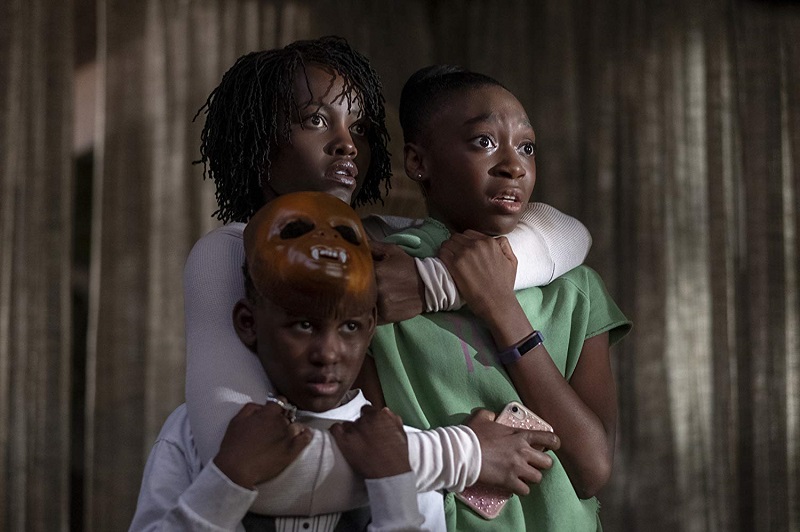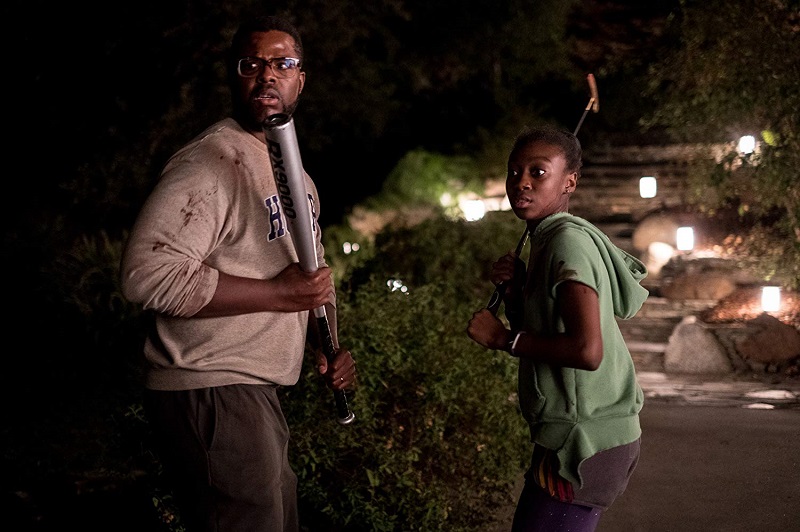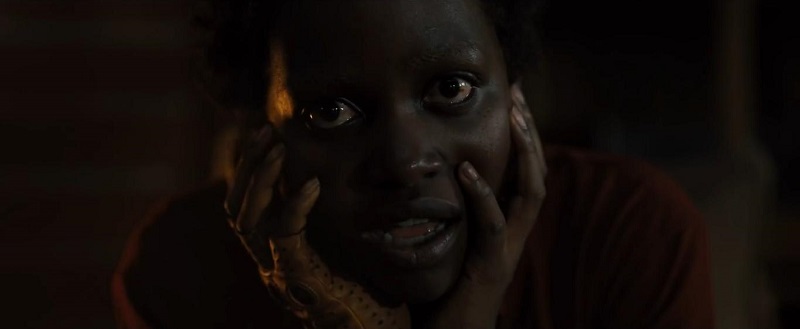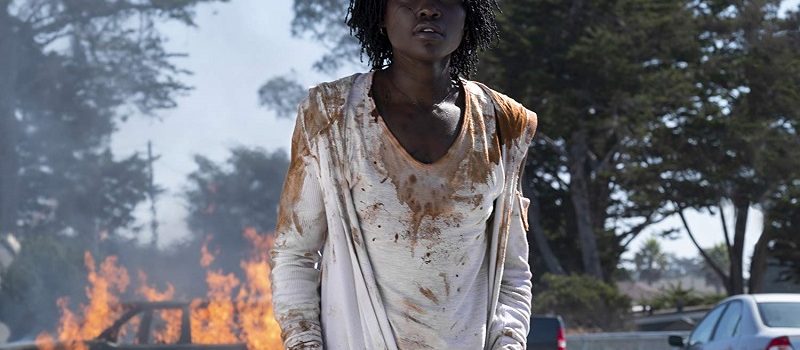Funhouse mirrors are always a bit eerie, if you ask me. After experiencing writer-director Jordan Peele’s newest nightmare, they will take on a whole fresh level of horror.

In his follow-up to the Oscar winning Get Out, the filmmaker has firmly established himself as a garishly gifted storyteller who is capable of not only turning out the lights and praying on our deepest fears but does so in a manner that puts one of those funhouse mirrors up to Us.
Academy Award winner Lupita Nyong’o is Adelaide Wilson, who has returned to the seaside community that she used to visit with her family as a youngster with her own clan. Something horrific happened to her in 1986 at the seaside locale that has her uneasy antennas buzzing into overdrive the millisecond her toes touch the Santa Cruz sand. Joining them are longtime friends Josh and Kitty Tyler (Tim Heidecker and Elisabeth Moss) and their teen daughters Becca and Lindsey (Noelle and Cali Sheldon).
Her husband Gabe Wilson (Winston Duke, who starred with Nyong’o in Black Panther) never knew what occurred to his wife all those decades ago, but before heads hits pillows on their first night at the beach house, Gabe will get a first-hand experience of the horrors that pierce his wife’s childhood memory.
That first night fear arrives when a family of four stand, hand-in-hand, where their beach house’s driveway meets the street. They are staring at the Wilson’s home, not saying or doing anything. This is long before anything of merit is revealed that would clue us in to why we should feel fear. Instead, it is how Peele hauntingly shoots the scene and the riveting reaction shots he gets from Adelaide, Gabe and their children Jason (Evan Alex) and Zora (Shahadi Wright Joseph) that informs that our story is set to take a zig-zag through familial hell. This quartet of oddness, once they home invasion themselves into the Wilson’s vacation bliss, are ringers for the family fab four. With eyebrows firmly raised, without saying a word, Peele’s actors are telegraphing everything viewers are sensing. It is the rare moment where protagonists’ permutations mirror ours. You are invested. You are involved. Above all else, you have completely and utterly let yourself fall into this astonishing abyss knowing that it is going to be one mesmerizing ride with the pitch-perfect Peele creepily smiling while firmly the wheel.
As was the case with Get Out, Peele’s latest is a horror film that is about so much more below the surface. This milieu of movies is so terrific with its uncanny ability to mask societal commentary—or any other rich point the filmmaker is trying to make—as a fright-fest and nothing more. That is the reason why so many of these works of art have transcended time and grabbed successive generations. For example, Rosemary’s Baby is not just about giving birth to the anti-Christ, now is it? That’s why it is such a priceless joy witnessing Peele shock and awe us with two straight films now that possess resonance that sticks to us indefinitely after credits roll and the lights come up. In that sense, I believe that Us will have that same response from audiences as Get Out. But it must be noted that each film is wildly dissimilar, tonally and aesthetically.
What Nyong’o achieves with her performance as both Adelaide and her doppelganger “Red,” is epic. Sometimes the horror genre gives actors something they cannot find in any other type of film—the freedom to explore polar opposites and dance on the line between sane and insane ever so deliquiate. Like Emily Blunt in A Quiet Place and Toni Collete in Hereditary, Nyong’o has delivered a mother who is operating in a horror film and through their performances and the characterizations that each actress employed, they have showcased how the institution of motherhood has maternal souls bearing the brunt of absorbing and diffusing fear in the modern household. As was the case with Blunt and Collette, Nyong’o deserves to be in the Oscar nomination conversation. The latter actress deserves the Academy Award buzz even more so due to her having to transform herself into a “twin.” How she achieved that vocal delivery for Red is a masterclass in the art of acting. It is stunning.
Duke delivers a modern father who must find new levels of strength that still is viewers’ way into the story. See, Nyong’o’s character has been exposed to this horror, so she is continually and methodically working the variables to try to find a way for her family to make it through this horrorific night and see the sun rise. Duke’s Gabe, on the other hand, this is all fresh fear that must be handled and processed, all while projecting his own type of strength to protect his kids. It’s a balancing act that is brilliantly brought to life by the Yale School of Drama graduate (fun fact: Nyong’o went there too!).

Can I just take a moment to salute the bodacious performance of Moss? She has the smallest of roles in Us but commands so decisively. Her stock is soaring—dating back to her scene-stealing turn in Mad Men through the current headline-grabbing turn that she dazzles us with in The Handmaid’s Tale. When she gets the opportunity to tackle both Kitty and Dahlia, one can just sense the talent exploding all over the screen as Moss gives us, yet again, a memorable movie moment.
Peele brilliantly lays his suspenseful seeds in a manner that ever so subtly spoon feeds his audience. That type of dramatic plot pacing and control recalls some of the genre’s finest—think Alfred Hitchcock, Brian de Palma in his prime and early David Fincher. There are hints of the horror early on in Us. Yet, they are revealed in such a nonchalant manner that allows one to get lost in the storytelling building blocks. Before you know it, Peele’s claws are firmly wrapped around your neck and one is drowning in a daunting sense of terror with no idea where, when and how often the bombastic blows will hit and in what form. Love a thriller that not only keeps you guessing as it progresses, but adds layers of mystery to the who, what, why, where and when that occurs when entering any storytelling medium.

Us is the type of film, like his Get Out, that will require multiple views. Knowing the full result of all that terror-ific drama heading into a second viewing, surely allows a priceless opportunity to mentally chronicle how Peele weaves this web. Experiencing his stories is a religious experience if your church happens to be the movie theater. There is much to think about exiting the theater after the Us gale force winds blow you away. There are little nuggets, or clues, strewn throughout that will also be pure joy in discovering with additional viewings. Wanting to watch a suspenseful film multiple times is the ultimate compliment to a filmmaker. Knowing where you’re going doesn’t take anything away from the experience, then you know you are in the midst of a gift. Just as Peele possess the gift of storytelling, it is like Christmas for us the viewers every single time one of his works commences. Let’s just say this too, after seeing Us, that Twilight Zone revival he’s shepherded over on CBS All-Access … is not must-see viewing. Rod Serling’s baby could not be in better hands.
Must note that although I compared him to Hitchcock and Fincher earlier, Peele is in an orbit all his own. He’s not the “next” anything. We’re in a period of artistry that has so few artists creating originality in Hollywood. What the former comedic half of Key and Peele is doing with his screen career is nothing short of carving a legacy that is utterly limitless.
Grade: A

